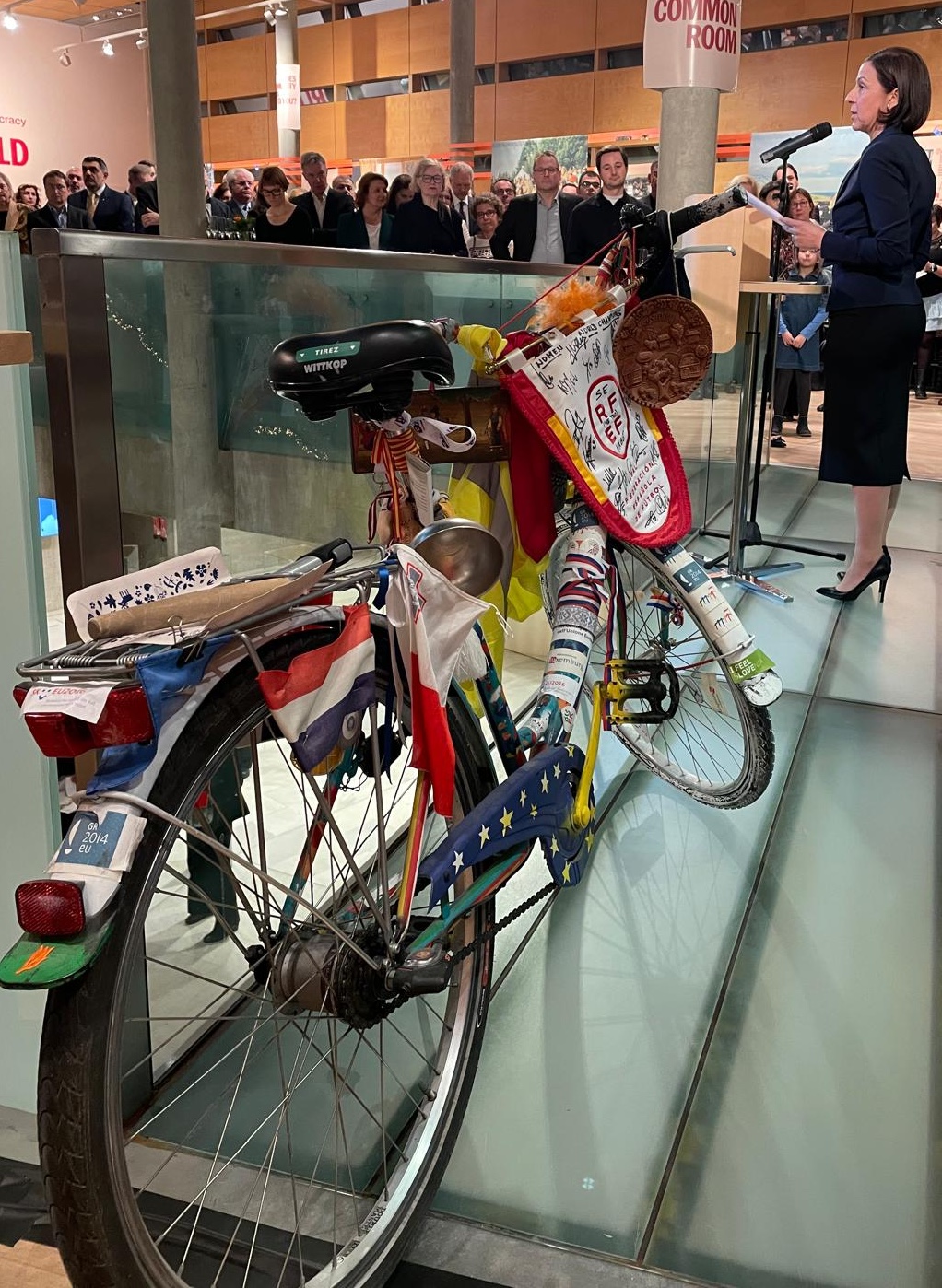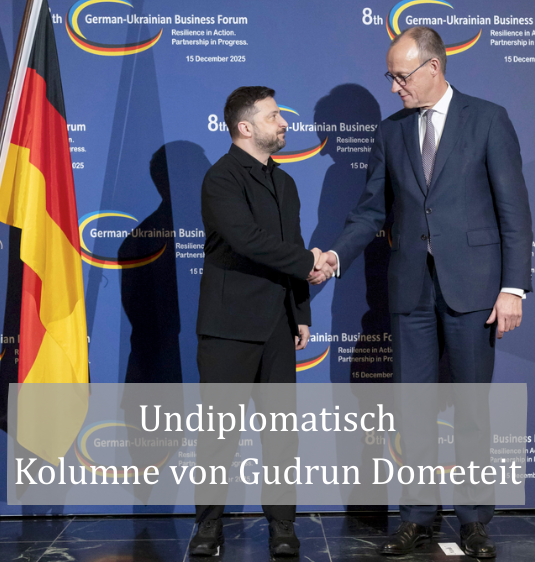diplo.news
“We need a fair peace, lasting a thousand years”

Interview by Michael Backfisch
Berlin. During his time as Ukrainian ambassador to Germany, Andrii Melnyk constantly urged the Federal Government to supply more and faster weapons to his attacked country. From November 2022, he was first Deputy Foreign Minister and then Ambassador to Brazil. In future, he will represent Ukraine at the United Nations in New York. diplo.news reached Melnyk via video call in the Brazilian capital Brasilia.
There are increasing signals surrounding US President Donald Trump: America wants to freeze the war and put Ukraine's NATO membership on the back burner. Isn't this increasing pressure on Kiev to give up territories?
Ukrainians want peace, but not at any price. A small majority of the population would be in favor of negotiations today. So there is a mandate for diplomatic efforts. Each negotiation process involves certain concessions and compromises. But on the one hand, Putin is not prepared to negotiate at all; he is seeking a complete surrender of Ukraine. And that is unacceptable. On the other hand, there is an immovable red line for us. We are not going to trade with our national territory, because we are not on a livestock market. Even in the worst nightmare, I cannot imagine that Ukraine will renounce the occupied territories.
Calls for peace negotiations are also growing louder in Europe. According to Russian Foreign Minister Sergei Lavrov, France has called for confidential talks on Ukraine - bypassing Kiev. Has the wind changed?
First of all, we don't know whether Lavrov is shamelessly lying or spreading half-truths in order to sow mistrust and drive a wedge between Ukraine and our French and European allies. This is a tried and tested war tactic used by the Russians. It would be deceptive to give in to widespread sentiment and literally beg for Putin to start negotiations as quickly as possible. This would mean standing in line in front of the Kremlin to get back into conversation with the Russian President as a potential mediator. Going it alone would be extremely dangerous. It would also be ineffective to reflect publicly on which compromises appear acceptable from a Ukrainian perspective. This can only be discussed behind closed doors. It is clear that there will be no solution over the heads of Ukrainians. If we were to try to reach a long-term and equitable peace agreement that would guarantee Ukraine's security over decades and centuries, our American and European allies would have to coordinate so closely with us in advance that no sheet of paper fits in between. We should take a common line with Russia and possibly also with China. At the same time, arms supplies should be massively increased. This is the only way, from a position of strength, that Putin can be forced to make peace.
If Ukraine cannot push the Russians back completely: What would be the second-best solution for your country? Where do you see points of contact for possible negotiations with Moscow?
This is a very difficult question for every Ukrainian. Because at the moment, the Russians have occupied over 27 percent of our national territory. If you were to compare this with Germany, the area would be as large as the federal states of Brandenburg, Mecklenburg-Western Pomerania, Saxony and Saxony-Anhalt combined. Would the Germans refrain from doing so? I don't believe that. There is currently no Plan B in civil society or in the government of Ukraine as to what could happen if the military support from our partners dries up and we have our backs against the wall all alone. If this discussion should happen one day, our options for action will certainly not be discussed publicly. However, President Volodymyr Zelensky has repeatedly emphasized that Russia's war of aggression could also be ended at the negotiating table if the necessary conditions were created. Putin rejects this because he sees himself on the offensive in Donbass. The Russians will only be prepared to negotiate seriously when there is no more military progress for Moscow. For this reason too, we hope that the Americans will not reduce their arms supplies, but expand them.
President Zelensky is exchanging 40 ambassadors — more than ever before. Didn't the diplomats do their job well?
It is not for me to comment on my President's decision. He certainly has enough valid reasons for that. The events of war are changing rapidly, as is the situation on the diplomatic front. This requires constant readjustment, including with regard to personnel. My President knows that sometimes a single ambassador can work wonders, particularly in the most important countries whose support our survival depends on.

They will soon represent Ukraine at the United Nations. Can the UN do anything to end the war?
Although many like to criticize the UN — and often rightly so — the United Nations remains the most important universal organization that humanity has established. And the UN Charter of 1945 remains a kind of Bible for international relations to this day. This means that the basic principles enshrined in it, such as territorial integrity, must be sacred for the world community. The problem with the Russian war of aggression: The UN Security Council, which was given “primary responsibility for maintaining world peace, is blocked by Russia's veto. It cannot take robust measures binding under international law in the event of such “acts of aggression,” for example to impose economic sanctions or trade embargoes.
So the UN is just a paper tiger right now?
There have been over 30 cases in the past where the UN Security Council has successfully introduced such sanctions regimes against aggressor states - but not after Russia's large-scale military invasion of Ukraine on February 24, 2022. That is why Brazil, for example, says: We cannot support the sanctions imposed by the EU, the USA and other states such as Great Britain or Japan against Russia because they are not decided by the UN Security Council. That is pure cynicism. Double standards are used here. On the one hand, Brazil wants to “reform” the United Nations and claims the seat of a permanent member of the Security Council itself. On the other hand, in the current stalemate, the country is inactive to actively combat the bloodiest aggression in Europe after 1945. As a result, Brazil has become the largest importer of Russian diesel. It thus helps to fill Putin's war chest — with over 10 billion US dollars a year. With this money, Moscow can wage war against Ukrainian civilians for a month and a half.
What do you want to do specifically?
There is a huge need for action at the UN. I too have my hands full in my new role. Instead of the Security Council, the UN General Assembly is playing an important role in condemning Russian aggression. However, their decisions are not legally binding. During the Korean War from 1950 to 1953, it was at least possible to creatively circumvent the right of veto of the Soviet Union, which boycotted the UN at the time. At that time, it was decided to send peacekeepers. Even today, we must see what could be done together with our allies such as Germany in order to set new topics. This includes how to reform and save the United Nations.
The Global South has so far shown only moderate interest in the Ukraine war. How do you want to change that in New York?
Among other things, my task will be to find a smart way to integrate the Global South more closely and expand Ukraine's circle of friends. At the same time, I will clearly state the facts: Anyone who imports Russian oil, gas, diesel or fertilizer is indirectly financing Putin's war of aggression. Period! Perhaps the UN General Assembly will be able to point out limits here, at least in the form of a political commitment.
What is your assessment: How much longer will the war last?
I personally hope that this barbaric war will end in 2025. The Ukrainians are longing for peace. But we need a fair, thousand-year peace, not the deceptive ceasefire that many people have in mind. We need an all-encompassing peace treaty based on the UN Charter with rock-solid security guarantees. Only he can ensure that Ukraine is never attacked again and that a new war in the middle of Europe is never repeated again.




